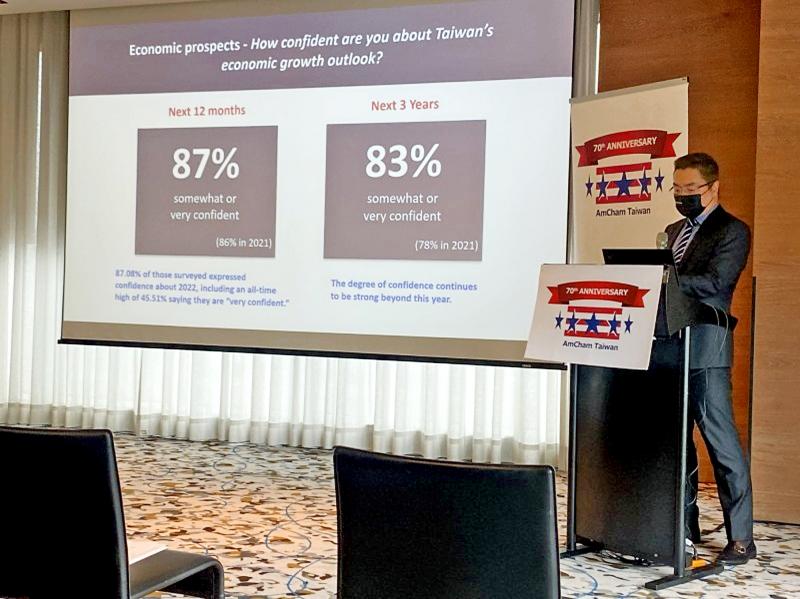A record 90 percent of US companies in Taiwan expect revenue growth this year, while many want the government to prioritize energy issues to ensure sufficient supply and stable voltage, the American Chamber of Commerce in Taiwan (AmCham) said yesterday.
While last year was challenging for the global economy, Taiwan demonstrated its resilience with an impressive economic performance, the chamber of 1,050 members from 500 international companies said in a survey it conducted last month and this month.
GDP growth is likely to fare well again this year, as demand for Taiwanese exports remains sturdy, it said.

Photo: Huang Pei-chun, Taipei Times
Consistent with this trend, the annual business climate survey indicated high levels of optimism among member companies regarding the economic outlook.
Among the respondents, more than 87 percent expressed confidence in Taiwan’s economic growth over the next 12 months, while 83 percent were positive about the outlook over the next three years, the AmCham said.
Taiwan’s stable economy has prompted a record 90 percent of members to indicate confidence in their revenue growth prospects over the next 12 months, with 91 percent confident over a three-year span, it said.
Sixty-one percent said that President Tsai Ing-wen (蔡英文) should give top priority to the energy issue, followed by COVID-19 pandemic control (46 percent), cross-strait relations (42 percent), and trade agreements with the US and other partners (42 percent), the survey showed.
On the energy front, a majority voiced concern over power supply, voltage stability, the cost of electricity and progress toward green energy, with the degree of concern rising by double percentage points from a year earlier, it said.
Grid resiliency — a response item added this year — was a concern for 71 percent, it said.
Nearly 80 percent of respondents cited at some impact on operations from increased US-China competition, with more than 42 percent calling the effects positive.
As for economic accords, more than 65 percent supported the negotiation of a bilateral trade agreement with the US, while 62 percent backed Taiwan’s admission to the Comprehensive and Progressive Agreement for Trans-Pacific Partnership, the survey showed.
It said that 95 percent of respondents expected Taiwan’s bilingual policy to benefit economic development, but some doubted that the goal is achievable by 2030.

The CIA has a message for Chinese government officials worried about their place in Chinese President Xi Jinping’s (習近平) government: Come work with us. The agency released two Mandarin-language videos on social media on Thursday inviting disgruntled officials to contact the CIA. The recruitment videos posted on YouTube and X racked up more than 5 million views combined in their first day. The outreach comes as CIA Director John Ratcliffe has vowed to boost the agency’s use of intelligence from human sources and its focus on China, which has recently targeted US officials with its own espionage operations. The videos are “aimed at

STEADFAST FRIEND: The bills encourage increased Taiwan-US engagement and address China’s distortion of UN Resolution 2758 to isolate Taiwan internationally The Presidential Office yesterday thanked the US House of Representatives for unanimously passing two Taiwan-related bills highlighting its solid support for Taiwan’s democracy and global participation, and for deepening bilateral relations. One of the bills, the Taiwan Assurance Implementation Act, requires the US Department of State to periodically review its guidelines for engagement with Taiwan, and report to the US Congress on the guidelines and plans to lift self-imposed limitations on US-Taiwan engagement. The other bill is the Taiwan International Solidarity Act, which clarifies that UN Resolution 2758 does not address the issue of the representation of Taiwan or its people in

US Indo-Pacific Commander Admiral Samuel Paparo on Friday expressed concern over the rate at which China is diversifying its military exercises, the Financial Times (FT) reported on Saturday. “The rates of change on the depth and breadth of their exercises is the one non-linear effect that I’ve seen in the last year that wakes me up at night or keeps me up at night,” Paparo was quoted by FT as saying while attending the annual Sedona Forum at the McCain Institute in Arizona. Paparo also expressed concern over the speed with which China was expanding its military. While the US

SHIFT: Taiwan’s better-than-expected first-quarter GDP and signs of weakness in the US have driven global capital back to emerging markets, the central bank head said The central bank yesterday blamed market speculation for the steep rise in the local currency, and urged exporters and financial institutions to stay calm and stop panic sell-offs to avoid hurting their own profitability. The nation’s top monetary policymaker said that it would step in, if necessary, to maintain order and stability in the foreign exchange market. The remarks came as the NT dollar yesterday closed up NT$0.919 to NT$30.145 against the US dollar in Taipei trading, after rising as high as NT$29.59 in intraday trading. The local currency has surged 5.85 percent against the greenback over the past two sessions, central